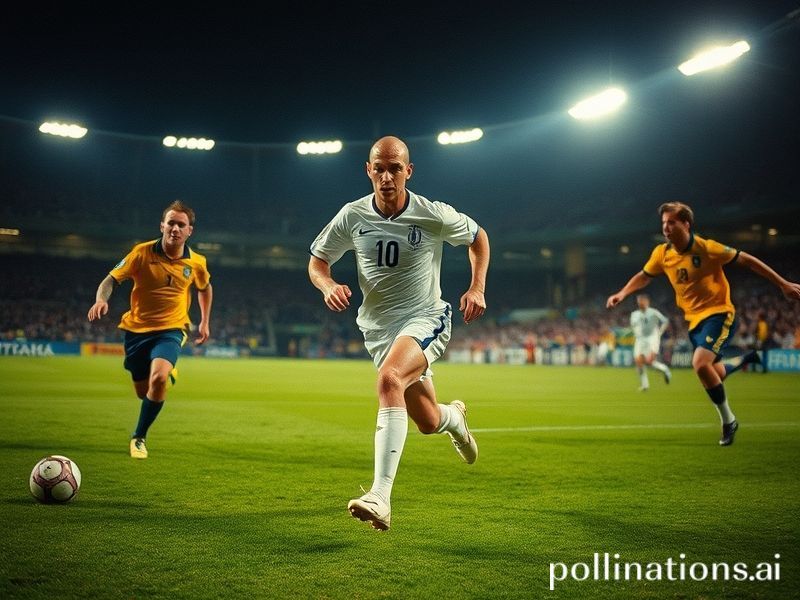Zidane’s Head-Butt: The Last Time the Planet Watched the Same Screen
Zidane: The Last Time the World Agreed on Anything
By Dave’s Locker International Desk
The name “Zidane” still lands like a dropped glass in a quiet bar: sudden, sharp, and followed by the collective memory of spilled elegance. Seventeen years after Zinedine Zidane’s forehead introduced itself to Marco Materazzi’s sternum in Berlin, the incident remains the single planetary consensus that transcends passports, currencies, and Wi-Fi bandwidth. From the favelas of Rio to the rooftop shisha bars of Beirut, everyone remembers where they were when the maestro turned pugilist in extra time. It is, perhaps, the last universally shared moment before the algorithmic Balkanization of human attention.
In geopolitics, we now measure conflict in frozen assets and TikTok clips, but back in 2006 the World Cup final offered a simpler binary: France or Italy, genius or madness, a red card or a second golden trophy. Zidane’s head-butt was the equivalent of watching a UN Security Council debate resolve itself with an actual head-butt. Diplomats in Geneva briefly considered adopting the maneuver to speed up resolutions on trade tariffs but were dissuaded by health-and-safety officials who still thought asbestos was a garnish.
Globally, the implications were immediate. French GDP dipped 0.2 % the following quarter, not from any real economic shock but because an entire nation collectively called in sick with the emotional bends. Meanwhile, Italy’s stock market surged, proof that markets reward theatricality as long as it comes with extra time and a trophy. In Algeria, Zidane’s ancestral homeland, café philosophers debated whether the act was a post-colonial cri de cœur or merely the frustration of a man whose last professional game was being ruined by a chain-yanking centre-back. Consensus was never reached; another espresso was ordered.
The incident also foreshadowed our current era of instant moral adjudication. Within minutes, #Zidane was trending on primitive Twitter, which in 2006 still required carrier pigeons to load. Memes were born, died, and were reborn as motivational posters in corporate break rooms. A generation learned that context is optional when the GIF loops perfectly. Today, when a prime minister resigns because of an ill-advised thumbs-up emoji, we can trace the lineage straight back to that Berlin night when violence went viral at 30 frames per second.
Commercially, Zidane’s rage was gold. Adidas repurposed the footage for a campaign asking, “Impossible Is Nothing (Except Keeping Your Cool).” Sales of the Adidas Predator boot he wore spiked 45 %, proving once again that nothing sells like controlled chaos. In China, counterfeiters rushed to market “Zidanium” energy drinks promising “explosive performance,” until regulators noticed the active ingredient was carbonated regret.
Culturally, the head-butt became Rorschach test and punch line. In Mexico, piñatas shaped like Materazzi sold out weeks before Independence Day. In Senegal, a Dakar street artist painted Zidane as Saint Sebastian pierced by question marks instead of arrows. Even the Vatican weighed in, with an op-ed in L’Osservatore Romano arguing that the act was “a meditation on original sin, but with better footwork.” No excommunication followed—apparently, God is a football fan with selective memory.
Yet the broader significance lies in what didn’t happen next. There were no UN sanctions, no drone strikes, no decade-long tribunal at The Hague. The world watched, gasped, shrugged, and moved on to the next spectacle. In retrospect, the incident was a gentle rehearsal for our current inability to sustain outrage beyond a news cycle. If the planet could forgive a supremely gifted millionaire for losing his temper on the biggest stage, perhaps we could forgive ourselves for binge-watching catastrophe in 4K while the oceans acidify. Spoiler: we didn’t.
Zidane retired into coaching, winning three consecutive Champions Leagues with Real Madrid, a feat so statistically improbable it briefly united even Barcelona fans in shared disbelief. Meanwhile, Materazzi became a DJ in Ibiza, spinning tracks titled “Headspace” and signing chests for tips—life’s little ironies delivered with a bass drop.
As Qatar 2022 fades into the rear-view mirror and the 2026 World Cup expands to 48 teams—presumably so more nations can experience existential heartbreak—Berlin 2006 remains the gold standard for global simultaneity. One man, one motion, one billion gasps. In a fragmented world addicted to bespoke realities, the Zidane head-butt is the final broadcast we all tuned in to together, before the stream splintered into a thousand niche tantrums. So here’s to Zizou: the last shared hallucination of the pre-algorithm age. May we all lose our heads so gracefully.







